Conferences & symposia
Robert Wood (1717-1771) Classicist and Traveller: Eighteenth-Century Books and European Networks
| Friday, 14 October, 2022 | Marsh’s Library, Dublin Organised by UCD School of Art History and Cultural Policy in collaboration with Marsh’s Library, Dublin Registration: (opens in a new window)https://robertwoodclassicisttraveller.eventbrite.ie This symposium is organised around the commemoration of the 250th year anniversary of the death of Robert Wood (1717-1771), classicist and traveller, with a focus on his pioneering publications Ruins of Palmyra (1753) and Ruins of Balbec (1757) and their impact on the classical revival in the eighteenth and nineteenth centuries. Researchers have responded to the call to explore three broad thematic sessions: the first is a focus on Robert Wood, his expeditions and publications and their impact on design and ornament for European neoclassicism; the second theme examines Rome networks as Rome remained the principal focus in Europe for Grand Tourism; and the third presents new research on the reception and afterlife of classical revivalism in the domestic and secular architecture of Great Britain and Ireland. An exhibition of Robert Wood’s books will be on display in Marsh’s Library for the duration of the symposium, while a new, revised edition of R. Finnegan and L. Mulvin’s, The Life and Works of Robert Wood Classicist and Traveller (1717-1771) (Archaeopress, Oxford, 2022) will be launched at the event. |
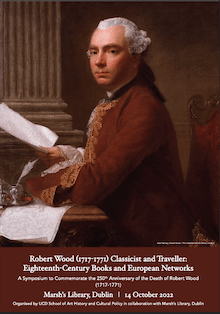 |
Registration: 09:00-09:15 Marsh’s Library
Invited Speaker: Jason McElligott (Director, Marsh’s Library) Eighteenth-Century Books and European Networks
Session One: Robert Wood
09:30 Rachel Finnegan (Independent Scholar) The Life, Works and Library of Robert Wood (1717-1771)
09:55 Lisa Kraege (Princeton) Facing Homer: Robert Wood and Alexander Pope
10:20 Olga Zoller (Independent Scholar) Wood and Borra: Some Thoughts (Online)
Tea & Coffee 10:45 -11:05
11:05 Felix Martin (RWTH Aachen) Lord Charlemont, Robert Wood and the Architectural Drawing in the TravelPublications of the 1750s
11:30 Desmond Kraege (Princeton) Knowledgeable Adventurers: The Figure of the Architectural Scholar-Traveller,ca. 1740-1800
11:55 Elizabethann Boran (Worth Library) The Eighteenth-Century Library of Edward Worth
Q&A 12.20
Lunch
Session Two: Rome Networks
13:45 Sean Leatherbury (UCD) Palmyra after Wood: Louis-François Cassas' Ruins between Science and Fantasy
14:10 Josip Belamaric (Art Institute Zagreb ) Robert Adam, Wood and Diocletian’s Palace (Online)
14:35 Pier Andrea de Rosa (Independent Scholar) A dilemma in draughtsmanship: Pomardi and Dodwell (Online)
Tea & Coffee 15:00-15:20
Session Three: Reception and Afterlife
15:20 Conor Lucey (UCD) The Grand Tour of Joseph Rose, Plasterer and Stucco-worker
15:45 Deirdre Cullen (UCD) Grand Tours, libraries, and letters – aspects of the reception of antiquity in theLong Gallery of Castletown
16:10 Andrew Tierney (TCD) Roman Architectural Carving: Dissemination and Craft
Q&A 16:35
Lynda Mulvin (UCD) Closing Remarks and Launch of Book
Species of Domestic Spaces: House and Home in Eighteenth-Century IrelandFriday, June 18, 2021 This conference was convened by Dr Conor Lucey, UCD School of Art History and Cultural Policy & organised by UCD Humanities Institute. In his 1974 essay 'The Apartment' (published in Species of Spaces), author Georges Perec imagined a typical late twentieth-century apartment in Paris, and the various ways in which its rooms were inhabited (and corresponding rituals were performed) over the course of a working day: at various times the protagonists of the family (mother, father, child) occupy rooms singly (bathroom, kitchen) and collectively (sitting room, dining room). Essentially a literary exercise on the mundane, the text nonetheless deliberates on the adaptable functions of, and relationships between, discrete domestic spaces in an effort to counter the ‘very precise ideas’ routinely imposed by architects, builders and urban planners. |
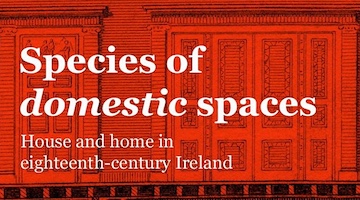 |
- Rachel Wilson: Making a castle a home: Dublin Castle as a residence, c.1684–1801
- Patricia McCarthy: A male domain? The dining room reconsidered
- Emma O’Toole: Brought to bed: the spaces and material culture of maternity in the eighteenth-century household
- Melanie Hayes: Material impact: furnishing, fitting-out & functionality in the aristocratic house
- Aisling Durkan: The merchant house in eighteenth-century Drogheda
- Sarah Foster: ‘Plain as becometh the truth’: piety, comfort and display in the Quaker home
- Claudia Kinmonth: Communality versus privacy: arrangements of personal space in rural domestic households to 1830
- Judith Hill: Entertaining royalty after the Union: space, decoration and performance in a recently completed Gothic castle
- Priscilla Sonnier: ‘A taste for building’: domestic space in elite female correspondence
- Conor Lucey: Single lives, single houses
Art and Reality: The Role of Visual Culture in the post-independent stateFriday, 19 October 2018, UCD Humanities Institute The symposium was organised by Dr Roisin Kennedy and was a joint initiative between the UCD School of Art History and Cultural Policy and NIVAL, the National Irish Visual Arts Library. The symposium was funded by UCD Decade of Centenaries. Podcasts of the 10 papers are available on SoundCloud (opens in a new window)here >>> The symposium examined the role of visual culture in constructing and critiquing the state and national identity in the aftermath of political independence. The foundation of the Irish Free State was marred by partition, Civil War and division over sociopolitical goals. Other newly independent European nations in the post 1918 period experienced similar dissonance and chaos, often following the great hopes aroused by independence. Speakers discussed the role of art and design in constructing and critiquing the new state and national identity in the early years of the Irish Free State and in other ‘new’, revived and remade European states in the post 1918 period. |
 |
- Eimear O’Connor: Seán Keating and the Art of Nation Building
- Síghle Bhreathnach-Lynch: Expressions of Nationhood in Bronze and Stone: Albert Power RHA
- Fionna Barber: The Vibrant Studio: Margaret Clarke’s performative femininities and 1920s painting
- Elaine Sisson: Irish Modernity in Fancy Dress – The Costume Balls of the 1920s
- Hilary O’Kelly: Dress in Our Boys in the Independence Period, c.1910-40
- Orla Fitzpatrick: The National Museum of Ireland and the Metropolitan School of Art
- William Shortall: The Chicago World’s Fair 1933
- Stephen O’Neill: The Visual Culture of Partition in the North of Ireland
- Angela Griffith: James Crampton Walker’s ‘Irish Life and Landscape’
- Conor Linnie: ‘To Kick Ireland into Artistic Wakefulness’. The Klaxon and the Politics of Post-Independence Irish Art Writing
Scholar in Focus: Margaret Stokes (1832-1900): Archaeologist and AntiquaryDate: Wednesday, 27 June 2018. Venue: Royal Society of Antiquaries of Ireland, 63 Merrion Square South, Dublin 2 This symposium celebrated the archaeologist and illustrator Margaret Stokes (1832-1900). The most important Irish woman antiquary of the Victorian era, her scholarship, editing and illustrations were esteemed by contemporaries throughout Europe. The symposium examined Stokes' work on Irish antiquities, resulting in such notable publications as Early Christian Art in Ireland (1887), while also exploring the results of her intrepid research expeditions abroad, even late into her career. |
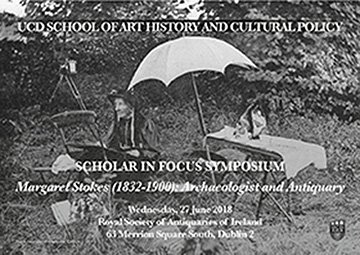 |
Chair: Peter Harbison, MRIA
- Janette Stokes, Independent Scholar: Introducing Margaret Stokes
- Marie Bourke, Art and Cultural Historian: Margaret Stokes and her cultural milieu
Chair: Fintan Cullen, University of Nottingham
- Jane Hawkes, History of Art, York University: Margaret Stokes and the visual translation of early Medieval monuments
- Philip McEvansoneya, Department of History of Art and Architecture, TCD: Margaret Stokes, writing for money
Chair: Róisín Kennedy, UCD
- Jenifer Ní Ghrádaigh, Independent Scholar: Margaret Stokes and George Petrie’s Christian Inscriptions.
- Lynda Mulvin, School of Art History and Cultural Policy, UCD: Margaret Stokes and pioneering investigations of ‘Irish Scribes on the Continent’
Chair: Audrey Whitty, NMI
- Niamh NicGhabhann, University of Limerick: “Immeasurably more art in the carved decorations of a South Sea or South African spear-handle”: negotiating cultural values within nineteenth-century Irish antiquarian discourse.
- Peter Murray, Art Historian: Margaret Stokes: an overview.
Scholar in Focus: Françoise Henry (1902-82)Date: Friday, 2 June 2017. Venue: Royal Irish Academy, No. 19 Dawson Street, Dublin 2 This conference celebrated eminent art historian and archaeologist Françoise Henry. An outstanding scholar, with a far reaching international reputation, of Irish art from Early Christian to the Late Medieval period, Françoise Henry was responsible for establishing the discipline of Art History at undergraduate and postgraduate level at UCD, the teaching of which began in 1965. |
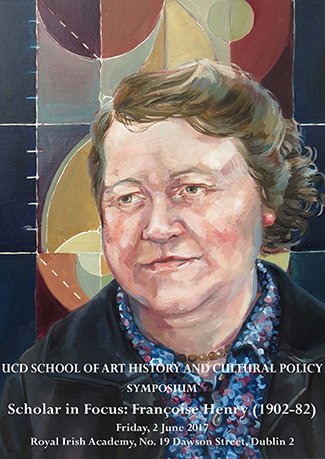 |
Chair: Lynda Mulvin, Art History, UCD
- Eileen Kane, Art History, UCD: Introducing Françoise Henry
- Kathleen James-Chakraborty, Art History, UCD: Henri Focillon and French Formalism
- Laurent Olivier, Museum of Saint-Germain-en-Laye: Françoise Henry at the National Museum of Archaeology in Saint-Germain-en-Laye: a Queen without a Castle?
Chair: Muiris O’Sullivan, Archaeology, UCD
- John O’Grady, Art History, UCD: Françoise Henry and UCD: Mademoiselle – person to person
- Peter Harbison, MRIA: An overview of Françoise Henry’s publications on early Irish art
- Janet Marquardt, Eastern Illinois University: The Zodiaque Series on Romanesque Art & the influence of Françoise Henry’s contributions 1963-64
Symposium: Paintings & Drawings from Russborough House
Friday, 18 November 2016 - The Chester Beatty Library, Dublin - 10:30-15:30
This symposium, organised by the School of Art History & Cultural Policy, is devoted to a group of important European old master paintings and drawings from the Beit Collection at Russborough House, Co Wicklow, which have gained recent notoriety due to attempts to dispose of them through public or private sale abroad, or through other means. They include works by artists of the calibre of François Boucher, Francesco Guardi, Adriaen van Ostade, Rubens, Jacob van Ruisdael, and David Teniers - and as such have an especial rarity in Ireland. Some have been saved for the nation thanks to the efforts of private philanthropy, others have now left the country, and some, including works by Gainsborough and Bellotto, remain largely hidden from public view, their fate unsure.
The aim of this symposium is to refocus scholarly expertise on the composition and development of the Beit collection, and the art historical significance of certain standout items. At the same time, this event will not ignore recent controversies surrounding the collection’s dispersal, and it offers the chance to celebrate what has been saved for the nation, lament what has been lost, and draw attention to those works which deserve further public and scholarly notice.
EAHN Conference, Dublin 2016
June 2016 - The fourth international meeting of the (opens in a new window)European Architectural History Network was held at Dublin Castle on 2-4 June 2016. Professor Kathleen James-Chakraborty was Chairperson of the Organising Committee for this major international conference.
This biennial conference aims to increase the visibility of the discipline, to foster transitional, interdisciplinary and multicultural approaches to the study of the environment, and to facilitate the exchange of research results in the field of architectural history. EAHN Dublin 2016 featured five blocks of parallel sessions; three keynote addresses by leading architectural historians; and a full program of walking tours of Dublin’s and bus tours of Ireland’s architectural heritage. Receptions for delegates were held in some of the city’s most important historic buildings.
Ireland and Mexico: Post-revolutionary Identities
| April 2015 @ IMMA - This symposium was organised by UCD School of Art History and Cultural Policy in association with the Irish Museum of Modern Art. Leading scholar on Hispanic art, Prof. Edward J. Sullivan (NYU) presented the keynote address, examining the major cultural, historical, and artistic tropes underlying Mexican identity and considering the misconceptions that cloud foreign perceptions of Mexican art and history. The work of artists Leonora Carrington, Diego Rivera, Frida Kahlo, Paul Strand and Sergei Eisenstein were explored by speakers Audrey Whitty (NMI), Sean Kissane (IMMA), Róisín Kennedy (UCD), and Orla Fitzpatrick (UU). Ireland and Mexico: Post-revolutionary Identities Schedule |
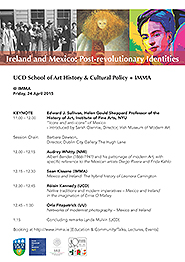 |
Irish Modernist Women: Networks of Production, Exchange, and Dissemination
March 2015 - A one-day symposium, organised by Dr Róisín Kennedy (UCD) and Dr Aintzane Legarreta (IMMA), looked at the role of Irish modernist women as artists, designers, writers, patrons, facilitators and critics, and on the networks they created, developed, and participated in. Schedule: Irish modernist women networks of production
Where is Art History Today? The Art and Architecture of Ireland in Context
November, 2014 - A one-day symposium, “Where is Art History Today?” was held in conjunction with the publication for the Royal Irish Academy by Yale University Press of Art and Architecture of Ireland. This event aimed to position the latest scholarship on Irish art and architecture in the context of recent international developments in art history as a discipline, and to communicate the vitality of contemporary art history to a general audience comprised of those interested in art as well as to students and staff from the academic community and to museum professionals. Penelope Curtis, the director of Tate Britain, delivered the keynote address.
Sacred Architecture in Ireland and Germany
October 2014 - The conference (opens in a new window)Sacred Architecture in Ireland and Germany was co-organised by Professor Kathleen James-Chakraborty, School of Art History and Cultural Policy, UCD and Lisa Godson, Faculty of Visual Culture, National College of Art & Design. The conference brought together scholars and architects engaged in the study and design of churches, synagogues and mosques and seeks to address the ways churches, synagogues, and mosques have been designed, used and understood over the last century, with a particular focus on Ireland and Germany. Sacred Architecture in Ireland and Germany was supported by University College Dublin and Goethe-Institut Irland.
Mapping an Altered Landscape: Cultural Policy and Management in Ireland
June 2014 - This one-day (opens in a new window)conference was jointly organised by the School of Art History and Cultural Policy at University College, Dublin, and the Department of Humanities and Arts Management, at the Institute of Art, Design and Technology, Dun Laoghaire. The conference brought together speakers from a wide variety of backgrounds across the cultural field in Ireland to consider key changes that have taken place since 2008 in policies, structures and management practices.
The conference was structured as a series of four moderated discussions between panellists and audience. The aim was to facilitate an inclusive dialogue that actively involves managers and practitioners from the arts and heritage sectors. Sessions aimed to:
• review current cultural policy issues and practices
• examine the fitness of both national and local government structures for the effective delivery of cultural services
• identify new forms of practice across the cultural field that have emerged in response to economic, social and technological change.
The focus was on identifying changes to the cultural policy landscape over recent years, some precipitated by economic crisis, others stimulated by social and technological change. The conference aimed to stimulate fresh perspectives on the strategic planning of cultural policy for the coming years.
Conference Programme (A UCD-IADT Collaborative Initiative, sponsored by the Arts Council and Heritage Council of Ireland)
Anglo-Irish orientalists, travellers, Dilletanti and architects: Ireland, the Mediterranean and book culture 1607-1810June 2011 - a one-day symposium that explored the theme of Ireland, the Mediterranean and book culture in the early modern period, celebrating the desire to gather and transport knowledge with a view to providing new information and creating impetus for artistic movements such as neo-classicism in Ireland, Europe and beyond. |
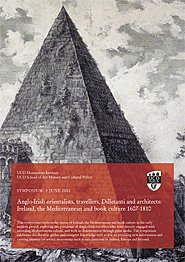 |
Orientalism and Anglo-Irish scholarship 1740-1810 in the Gennadius Library, AthensJune 2010 - The symposium, held in Athens was a collaboration between the School of Art History and Cultural Policy at University College Dublin, the Gennadius Library, Athens, and the Irish Institute of Hellenic Studies at Athens. It was supported by the UCD College of Arts and Celtic Studies Research Strand in Material and Visual Culture. The proceedings of this symposium were published in A Culture of translation: British and Irish Scholarship in the Gennadius Library (1740-1840), The New Griffon 13, Lynda Mulvin (ed), (The Gennadius Library, American School of Classical Studies, Athens, 2012). |
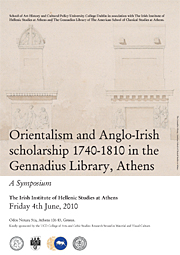 |
Re-imagining the Nation?: Transformations of German Cultural Identity since 1989
October 2009 - This conference was the major Irish event to mark the twentieth anniversary of the fall of the Berlin Wall. Opened by His Excellency Busso von Alvensleben, the German Ambassador to Ireland, the conference featured twenty-one speakers from four nations. The keynote addresses was delivered by the architectural historians Andres Lepik, from the Museum of Modern Art in New York, and the architect Zvi Hecker. The conference was sponsored by the German Embassy, the Goethe Institute, and UCD Seed Funding. [Reimagining programme]
September 2009 - The School of Art History and Cultural Policy, in conjunction with the Millennium Court Arts Centre, Portadown, hosted a panel discussion with the Guerrilla Girls, the acclaimed feminist art activist group who attempt to achieve equality of the sexes and "races" in art, film, politics and popular culture. Panellists included: The Guerrilla Girls; Susan McKay, Director of the National Women’s Council of Ireland/ Journalist; Catherine Marshall, Head of Collections at IMMA; Pat Cooke, Director of the MA in Cultural Policy & Arts Management at UCD
The Visual Culture of Modernity in Ireland
September 2009 - Organised by UCD School of Art History and Cultural Policy & the Faculty of Visual Culture, NCAD, this workshop was convened to interrogate critically the working concepts of modernity and ‘visual culture’ within Irish contexts.
The Art of Islam in Ireland todaySeptember 2009 - The School held a symposium with contributions by Dr Laura Parodi, visiting lecturer at UCD School of Art History & Cultural Policy, Dr Elaine Wright, Curator of the Islamic Collections, Chester Beatty Library & Dr Zeynep Kezer, School of Architecture Planning and Landscape, Newcastle University. |
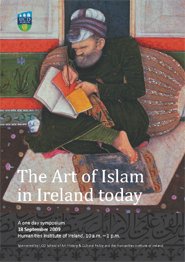 |
The Fusion of Neoclassical Principles: scholars, artists, architects, builders and designers in the Neoclassical periodMay 2009 - Convened by Dr Lynda Mulvin this conference brought together a prestigious multi-disciplinary panel of scholars who combined a range of approaches to the study of the Neoclassical period in Irish and European art and architecture. Sponsored by UCD College of Arts and Celtic Studies Research Strand in Material and Visual Culture, with the support of The Paul Mellon Centre for Studies in British Art, in association with the Irish Architectural Archive & the National Gallery of Ireland. [Neoclassicism programme] |
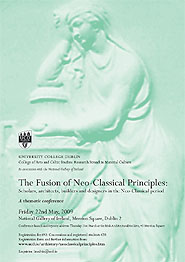 |
City Limits: Urban Identity, Specialisation and Autonomy in Seventeenth-century Dutch ArtApril 2009 - Convened by Dr John Loughman and Dr Adriaan Waiober [NGI]. Professor Eric Jan Sluijter of the University of Amsterdam gave the keynote address. Other invited speakers included Dr. Walter Liedtke of the Metropolitan Museum of Art, New York, and Professor Wayne Franits of Syracuse University. Sponsored by the National Gallery of Ireland, UCD School of Art History & Cultural Policy, UCD Seed Funding Scheme, UCD College of Arts and Celtic Studies Research Strand in Material and Visual Culture. [City Limits programme] |
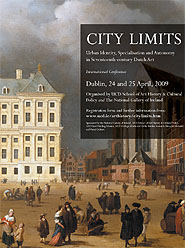 |
How Are We Doing? Managing Culture and the Arts in Ireland
July 2008 - Organised by Pat Cooke and Dr Emily Mark-FitzGerald, this conference for arts managers in Ireland was the first such gathering in seventeen years and aimed to give cultural sector managers, collectively and personally, an opportunity to take stock of their work in the wider context of policy and practice. From the perspective of the School of Art History and Cultural Policy, the goal was to better identify important policy, training and research issues. In addition, the dialogue stimulated and networks created through the conference helped deepen the contact between the school and practitioners.
The Eighteenth-century Townhouse: Form, Function & Finance
May 2008 - Convened by Dr Christine Casey this conference served to stimulate discussion and to promote interdisciplinary research on a topic of central importance to Dublin’s social, architectural and urban history. It was a collaborative effort between UCD, NUI Maynooth, TCD & the Royal Institute of Architects of Ireland and conservation bodies including the Dublin Civic Trust, the Irish Georgian Society and An Taisce. There was also international collaboration through the participation of Dr Toby Barnard [Hertford College, Oxford] and Dr Peter Guillery [Survey of London]. The Conference held as part of the UCD College of Arts & Celtic Studies Research Strand in Material Culture. [Townhouse programme]